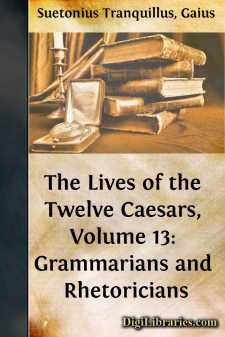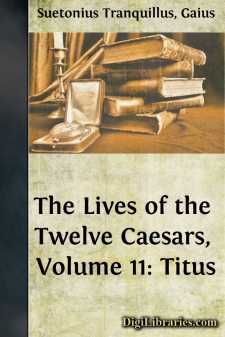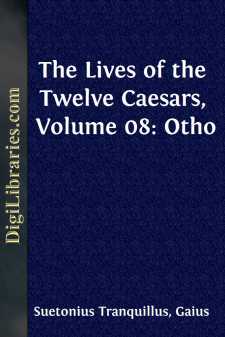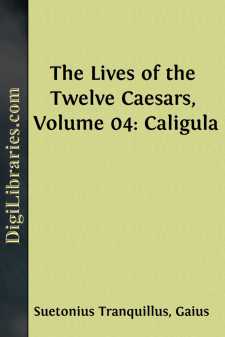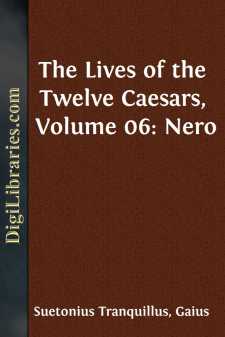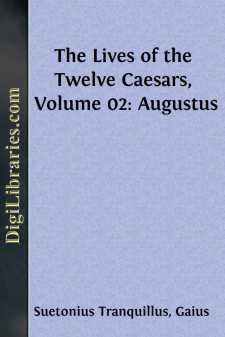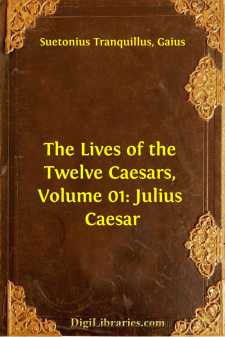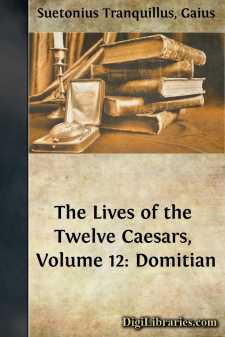Categories
- Antiques & Collectibles 13
- Architecture 36
- Art 48
- Bibles 22
- Biography & Autobiography 813
- Body, Mind & Spirit 142
- Business & Economics 28
- Children's Books 14
- Children's Fiction 11
- Computers 4
- Cooking 94
- Crafts & Hobbies 4
- Drama 346
- Education 46
- Family & Relationships 57
- Fiction 11828
- Games 19
- Gardening 17
- Health & Fitness 34
- History 1377
- House & Home 1
- Humor 147
- Juvenile Fiction 1873
- Juvenile Nonfiction 202
- Language Arts & Disciplines 88
- Law 16
- Literary Collections 686
- Literary Criticism 179
- Mathematics 13
- Medical 41
- Music 40
- Nature 179
- Non-Classifiable 1768
- Performing Arts 7
- Periodicals 1453
- Philosophy 64
- Photography 2
- Poetry 896
- Political Science 203
- Psychology 42
- Reference 154
- Religion 513
- Science 126
- Self-Help 84
- Social Science 81
- Sports & Recreation 34
- Study Aids 3
- Technology & Engineering 59
- Transportation 23
- Travel 463
- True Crime 29
The Lives of the Twelve Caesars, Volume 13: Grammarians and Rhetoricians
Description:
Excerpt
LIVES OF EMINENT GRAMMARIANS
(506)
I. The science of grammar [842] was in ancient times far from being in vogue at Rome; indeed, it was of little use in a rude state of society, when the people were engaged in constant wars, and had not much time to bestow on the cultivation of the liberal arts [843]. At the outset, its pretensions were very slender, for the earliest men of learning, who were both poets and orators, may be considered as half-Greek: I speak of Livius [844] and Ennius [845], who are acknowledged to have taught both languages as well at Rome as in foreign parts [846]. But they (507) only translated from the Greek, and if they composed anything of their own in Latin, it was only from what they had before read. For although there are those who say that this Ennius published two books, one on "Letters and Syllables," and the other on "Metres," Lucius Cotta has satisfactorily proved that they are not the works of the poet Ennius, but of another writer of the same name, to whom also the treatise on the "Rules of Augury" is attributed.
II. Crates of Mallos [847], then, was, in our opinion, the first who introduced the study of grammar at Rome. He was cotemporary with Aristarchus [848], and having been sent by king Attalus as envoy to the senate in the interval between the second and third Punic wars [849], soon after the death of Ennius [850], he had the misfortune to fall into an open sewer in the Palatine quarter of the city, and broke his leg. After which, during the whole period of his embassy and convalescence, he gave frequent lectures, taking much pains to instruct his hearers, and he has left us an example well worthy of imitation. It was so far followed, that poems hitherto little known, the works either of deceased friends or other approved writers, were brought to light, and being read and commented on, were explained to others. Thus, Caius Octavius Lampadio edited the Punic War of Naevius [851], which having been written in one volume without any break in the manuscript, he divided into seven books. After that, Quintus Vargonteius undertook the Annals of Ennius, which he read on certain fixed days to crowded audiences. So Laelius Archelaus, and Vectius Philocomus, read and commented on the Satires of their friend Lucilius [852], which Lenaeus Pompeius, a freedman, tells us he studied under Archelaus; and Valerius Cato, under Philocomus. Two others also taught and promoted (508) grammar in various branches, namely, Lucius Aelius Lanuvinus, the son-in-law of Quintus Aelius, and Servius Claudius, both of whom were Roman knights, and men who rendered great services both to learning and the republic.
III. Lucius Aelius had a double cognomen, for he was called Praeconius, because his father was a herald; Stilo, because he was in the habit of composing orations for most of the speakers of highest rank; indeed, he was so strong a partisan of the nobles, that he accompanied Quintus Metellus Numidicus [853] in his exile. Servius [854] having clandestinely obtained his father-in-law's book before it was published, was disowned for the fraud, which he took so much to heart, that, overwhelmed with shame and distress, he retired from Rome; and being seized with a fit of the gout, in his impatience, he applied a poisonous ointment to his feet, which half-killed him, so that his lower limbs mortified while he was still alive....


